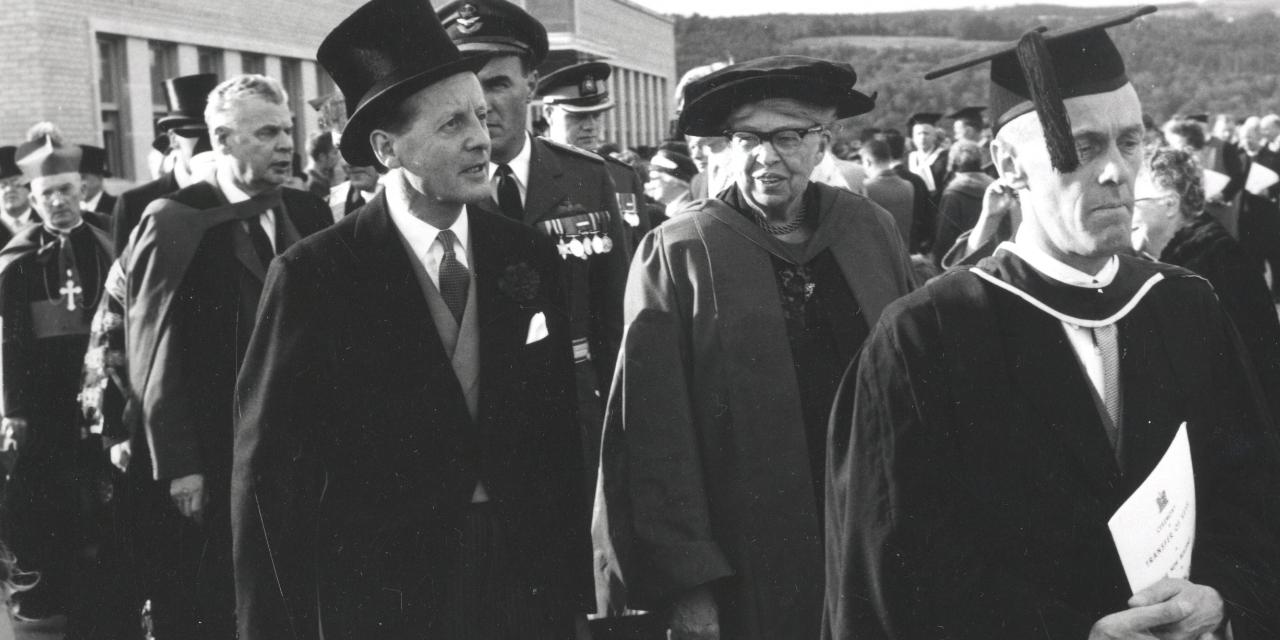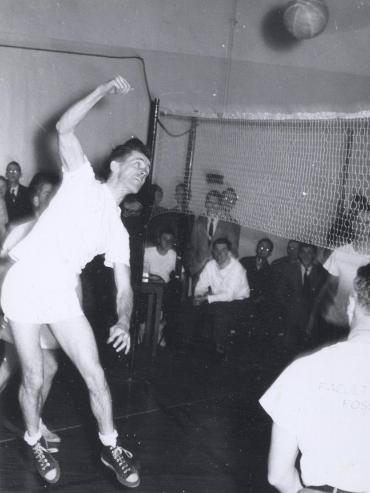Convocation cornerstone
It was called the game of the century. The battle of the giants.
It was February 1957, and the Faculty Fossils hockey team were pitted against the all-female Ferocious Females. Coach “Jolly Jack” Facey started the game by having goalie Ches “The Cat” Ivany escorted onto the ice in a chair — a psychological trick to make the opposing team overconfident.
In the second period, ever the crowd pleaser, Coach Facey surprised the fans by racing out of the players’ box and taking over in goal. He proceeded to give a demonstration of goaltending, “sans skates, sans gloves, sans pads.”
The Faculty Fossils went on to win 3-1 and were awarded the coveted Mudpuppy Cup, which represented hockey supremacy at Memorial in the 1950s.
This Jack Facey is far cry from how many would have encountered him over the years: in robes and mortarboard, staff in hand, ushering graduating students across the stage on convocation day.
As marshal of convocation for 46 years, it was Prof. Facey who ensured the smooth running of our convocation ceremonies, and it was he who determined how they would unfold in the first place.
John Morris Charles Facey (affectionately known as “Jack”) was born in White Rock, Trinity Bay. He attended Bishop Field College in St. John’s before heading to the University of London where he was awarded a bachelor of science in engineering.
He served in the Royal Navy in the Second World War and returned to the province in 1946 to join the faculty at Memorial University College as a lecturer in engineering and mathematics.
Just three years later, the college gained university status. That meant a convocation ceremony had to be planned for the four students graduating in 1950.
Starting from scratch, “the three Jacks” – Jack Ashley (Latinist), Jack Blundon (logician) and Jack Facey (protocol specialist) – worked out the details of that first convocation.
Following its humble beginnings, as graduation classes grew, Prof. Facey refined convocation in the early 1960s to create the ceremony we know today.

Jack Facey, as marshal of convocation, leads the dignitaries as they exit the Physical Education building following the opening of Memorial’s new campus on Elizabeth Avenue in October 1961. Behind Dr. Facey are Lieutenant Governor Campbell Macpherson and Eleanor Roosevelt with Prime Minister John Diefenbaker in the background. Photo from Memorial’s Digital Archives Initiative.
Perhaps his greatest ceremonial accomplishment was planning the 1961 special convocation to mark the opening of the new campus. With hundreds of students from across the province marching down Elizabeth Avenue, it was the largest parade ever held in Newfoundland at the time.
Nineteen distinguished individuals were awarded honorary doctorates at that event, and the recipients included such dignitaries as Eleanor Roosevelt, Edmund de Rothschild, the Duke of Devonshire and Prime Minister John Diefenbaker.
The ceremony was followed by a state banquet for 1,000 people, which was described as “the largest and most distinguished group of Newfoundlanders ever to gather.”
Over the years, Prof. Facey would be called on whenever a protocol specialist was needed.
He designed funeral processions to honour academic staff members. And when Queen Elizabeth II visited Memorial in 1978 to symbolically turn a sod and plant a tree for the new library, she was escorted by the marshal of convocation.
Prof. Facey was a gifted engineering professor who earned the title professor emeritus and was renowned for his ability to make complex mathematical concepts accessible and practical for his students.
One of those students, Dr. Darryl Fry, would later establish the Fry Family Foundation’s J.M.C. Facey Engineering Scholarship in his honour.
Prof. Facey was a distinguished figure at Memorial. His contributions left an indelible mark on our academic and ceremonial traditions, including the donation of a signing table in 1996, a piece that continues to be a central element in our convocation ceremonies.
When he was granted an honorary degree by Memorial in 1994, Dr. Shane O’Dea humorously reflected on the rules and decorum that the longtime marshal had established: “He has been marshal of convocation since 1950. As long as we have been subservient to Canada, we have been subservient to Jack.”
Prof. Facey was an inspirational teacher. He was an escort for a queen. He engaged with students in the classroom, in the gymnasium and on the ice.
And for every student who walks across the stage at convocation, he created the space for their moment in the spotlight.
